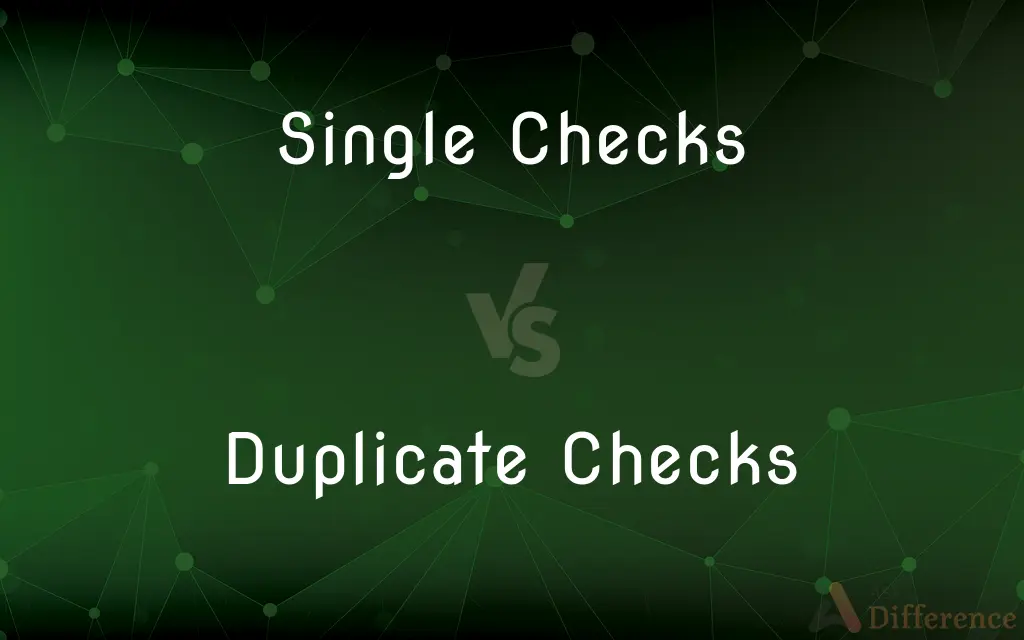Single Checks vs. Duplicate Checks — What's the Difference?
Edited by Tayyaba Rehman — By Fiza Rafique — Published on November 26, 2023
Single checks are individual check leaves without a carbon copy, while duplicate checks have an additional carbonless copy for record-keeping.

Difference Between Single Checks and Duplicate Checks
Table of Contents
ADVERTISEMENT
Key Differences
Single checks and duplicate checks serve the primary purpose of monetary transactions, yet differ in their structure and record-keeping functionalities. Single checks are essentially standalone check leaves. When one writes on a single check, it doesn't produce any automatic copy. Thus, if a user wishes to retain a record, they would have to manually record the details of each transaction.
Duplicate checks, in contrast, come equipped with a carbonless copy underneath each check. As one writes on the primary check, an impression is simultaneously made on the copy beneath it. This feature acts as an instant record-keeping tool, eliminating the need to jot down transaction details separately.
From a user's perspective, single checks can be seen as simpler and potentially less expensive due to the lack of additional layers. However, this simplicity also means there's a higher chance of overlooking transaction details unless manually recorded. Duplicate checks, with their built-in record-keeping feature, provide an added layer of convenience, especially for those who frequently issue checks and wish to monitor their transactions closely.
It's worth noting that the choice between single checks and duplicate checks often boils down to personal preference and the user's record-keeping habits. Some individuals value the streamlined nature of single checks, while others prioritize the instant documentation provided by duplicate checks.
Comparison Chart
Structure
Standalone check leaves
Checks with an additional carbonless copy
ADVERTISEMENT
Record-keeping
No automatic record
Instant copy provides automatic record
Cost
Generally less expensive due to simplicity
Might be slightly more expensive due to added carbonless paper
User Convenience
Simpler but requires manual recording of transactions
Offers instant transaction recording
Risk of Overlooking
Higher chance of missing transaction details
Reduced risk due to automatic documentation
Compare with Definitions
Single Checks
Usually less expensive due to the lack of copies.
Businesses on a budget might opt for single checks to cut costs.
Duplicate Checks
Eliminate the need for manual transaction recording.
Using duplicate checks, she bid farewell to her transaction diary.
Single Checks
Basic check format without additional layers.
Single checks are often chosen for their simplicity.
Duplicate Checks
Slightly costlier due to the added feature.
The convenience offered by duplicate checks often justifies the added cost.
Single Checks
Require manual recording of transaction details.
Using single checks made him maintain a separate transaction ledger.
Duplicate Checks
Include a primary check and its immediate copy.
Duplicate checks are a boon for those who frequently issue payments.
Single Checks
Standalone check leaves without copies.
She preferred single checks because of their straightforward nature.
Duplicate Checks
Checks with an attached carbonless copy.
For meticulous record-keeping, she always chose duplicate checks.
Single Checks
Offer no automatic documentation of payments.
While issuing single checks, she always kept a notebook to jot down details.
Duplicate Checks
Provide instant documentation of every transaction.
With duplicate checks, he never worried about forgetting a payment detail.
Common Curiosities
Can I convert my single checks to duplicate checks?
No, the format is determined at the time of printing.
Do all banks offer both check formats?
Most banks do, but offerings can vary; always inquire with your bank.
Are single checks and duplicate checks used for different purposes?
Both are used for monetary transactions; the difference lies in record-keeping.
Can I manually create a copy of a single check?
Yes, but it requires manually recording the transaction details.
Are duplicate checks safer than single checks?
Both are secure; however, duplicate checks provide an automatic transaction record.
Do duplicate checks cost more?
Generally, due to the added carbonless paper layer, they might be slightly costlier.
Are duplicate checks bulkier due to the added layer?
Yes, a checkbook with duplicate checks will be thicker than one with single checks.
Are there any environmental concerns with using duplicate checks?
They use more paper, so there's a slightly higher environmental impact compared to single checks.
Why would someone choose single checks over duplicate checks?
Some prefer the simplicity and potentially lower cost of single checks.
Do duplicate checks work with digital banking?
Yes, the primary check functions just like a single check in digital scenarios.
Is the carbonless copy in duplicate checks legible?
Yes, the impression is designed to be clear for record-keeping.
How do I differentiate between the two types in my checkbook?
Duplicate checks have a noticeable carbonless paper beneath each check.
Is one type more popular than the other?
It varies based on individual needs; some prioritize simplicity, while others value documentation.
Are there any other check formats beyond these two?
Single and duplicate are the most common, but there are specialized formats for businesses and specific purposes.
Can I get personalized designs on both check formats?
Yes, most check providers offer customization for both single and duplicate checks.
Share Your Discovery

Previous Comparison
Gherkins vs. Pickles
Next Comparison
NASA vs. ISROAuthor Spotlight
Written by
Fiza RafiqueFiza Rafique is a skilled content writer at AskDifference.com, where she meticulously refines and enhances written pieces. Drawing from her vast editorial expertise, Fiza ensures clarity, accuracy, and precision in every article. Passionate about language, she continually seeks to elevate the quality of content for readers worldwide.
Edited by
Tayyaba RehmanTayyaba Rehman is a distinguished writer, currently serving as a primary contributor to askdifference.com. As a researcher in semantics and etymology, Tayyaba's passion for the complexity of languages and their distinctions has found a perfect home on the platform. Tayyaba delves into the intricacies of language, distinguishing between commonly confused words and phrases, thereby providing clarity for readers worldwide.











































